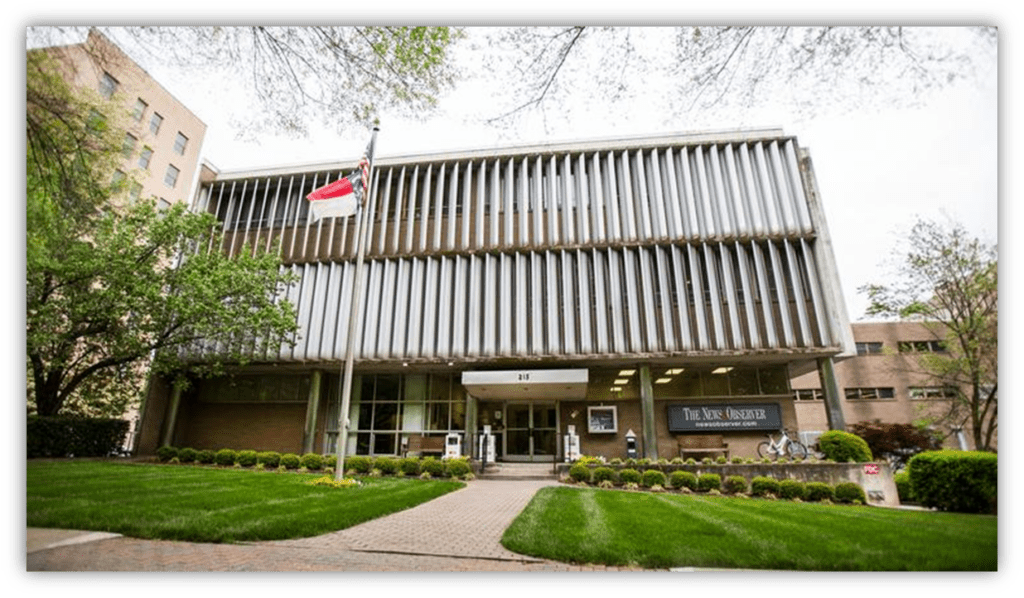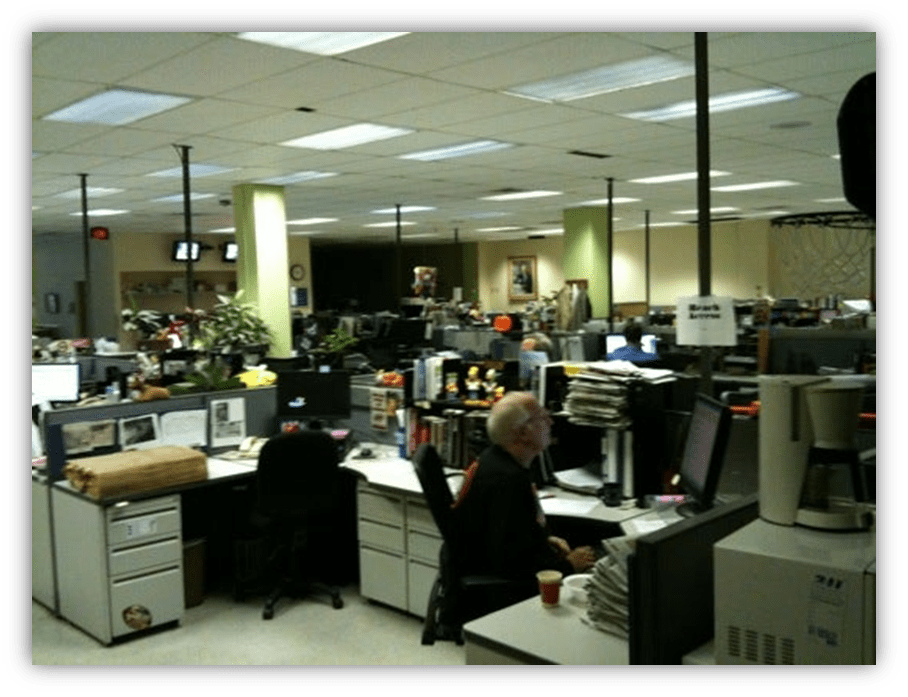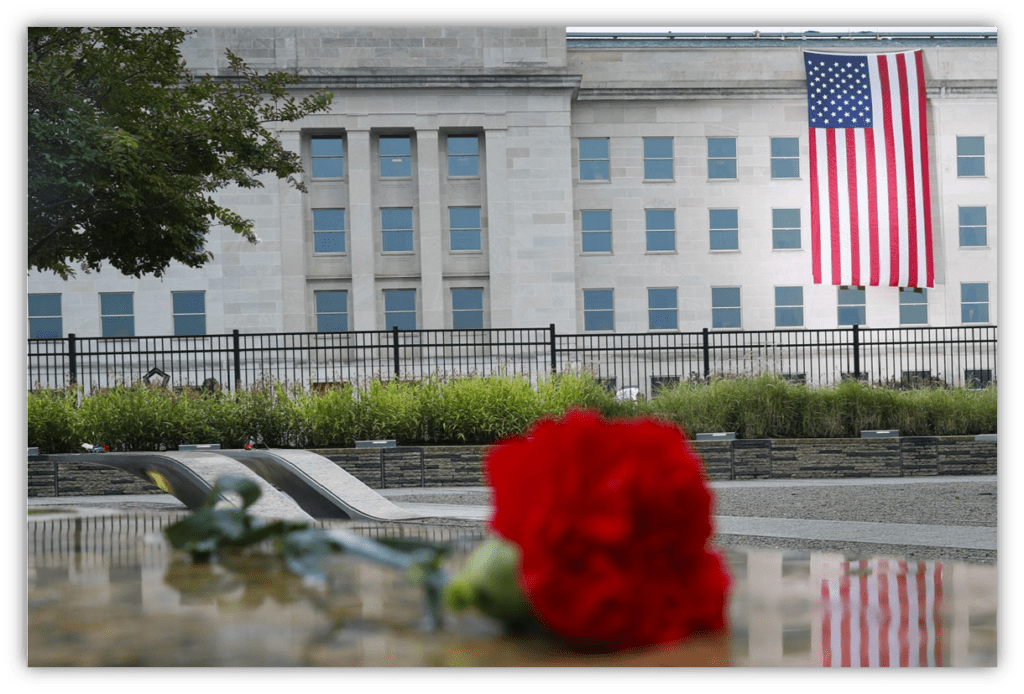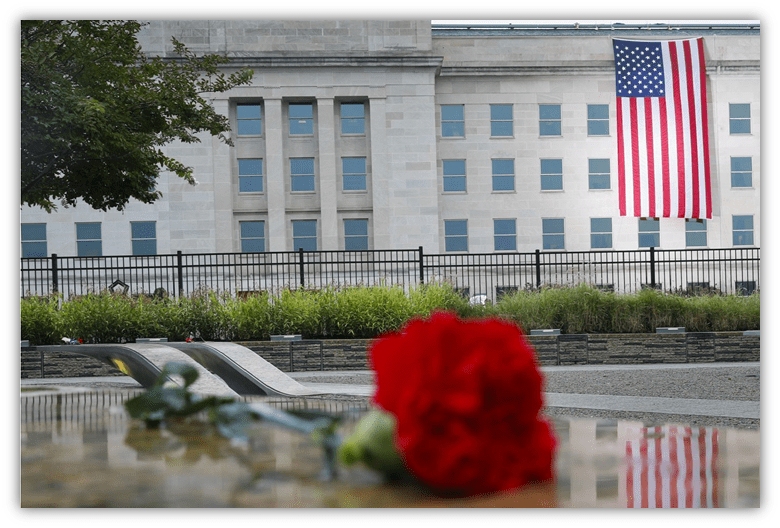It was my first day in the new job.
But not in any way I’d have imagined.
Tuesday, Sept. 11 2001, was scheduled to be my first day as deputy news editor. I was the Number Two Person on a copy desk of more than two dozen copy editors at Raleigh, North Carolina’s daily newspaper, The News & Observer.

The promotion had been announced a few days before while I was away at the annual convention of the National Lesbian and Gay Journalists Association. That year, I had been convention co-chair, and I’d returned home from Dallas on Monday, exhausted – but excited to see what came next.
I remember Tom waking me up before 10:00 AM, telling me that he’s seen on CNN that the World Trade Center had been bombed. (OK, so it wasn’t quite right, but he’s not the journalist in the family.) I said, “’You’re kidding,” and he said he wasn’t.
I raced to the shower and said, “Thanks for waking me up. From now on, this is the routine! I’ve got to get in to work.”
I showered, got dressed and raced over to The N&O, about a 10 minute drive from my home. The Features Copy Editors, who worked an earlier shift than the news copy desk, were already looking at the wire service reports. The night Metro Editor and my boss, the news editor, would arrive within minutes.

Among the five of us, we were able to pull together a collection of quick reports and write headlines and photo captions for a special edition that we put out by noon.
It was the first and only time in my life that I worked on a special edition run on the press, at a time other than the normal late-night deadlines.

We took the existing Tuesday paper and stripped out the front national and world news section. We filled it with as much as information as we could get of the initial story and photo coverage from New York, Washington, and the world.
Even as the special edition went to press, the newsroom had geared up for the Wednesday paper, the first of many to accommodate expanded world and national coverage.
Like many regional and metro newspapers, The N&O saw its primary mission as outstanding local and state capital coverage. Typically, national and world news focused on the top stories, a briefs package of secondary stories, and whatever additional reports the limited space in the front section (most pages of which were at least 50% advertising) could fit. Coverage after Sept. 11 changed that equation for at least a year, with wire coverage receiving expanded space, and special sections devoted to a blend of global, national and local coverage.
The rest of that week, adjusting to the new job and the new world at once, was a blur.
I didn’t really remember much else until the following Sunday when I listened to the Rev. Bill McConville, the newest Franciscan friar at my church, St. Francis of Assisi.

He was a lifetime friend of the Rev. Mychal Judge, one of the first whose bodies were found in the Trade Center wreckage.
As Bill gave the sermon – his first Sunday sermon at St. Francis – and received a standing ovation, I finally was able to take in what had happened, and I cried. When the congregation remained at the end of Mass, a thousand strong, to sing four verses of ”America the Beautiful,” I cried again. I left and was pulled over by at least a half-dozen parishioners who knew where I worked.
They thanked me for my efforts, one of the few times I’d heard such praise.
More than two decades later, my memories admittedly carry a detachment and focus on “the story. That may sound callous to anyone who hasn’t worked in a newsroom.
Horror and devastation remain for those who lost loved ones, witnessed destruction firsthand or remember where they were when they first learned of the events of Sept. 11.

Let the author know that you liked their article with a “heart” upvote!”





Great story, Chuck. As for me, I was walking from one college class to another when I heard about an airplane crashing into the World Trade Center. At that time, everyone figured it was a terrible accident. Then, after my second class had ended, we heard about the second plane, and it was clear that it was no accident.
A former roommate of mine was by 2001 living just a few blocks from the World Trade Center, and his experience was surreal and harrowing, something he would very much like to forget.
Mass trauma has a way of uniting people, and this attack did so, at first. Yet it was shortly after the attack that Fox News really came into its own as a source of right wing fearmongering and jingoism across the nation. Not to mention the unprecedented strides that the Bush administration took to make America much closer to an authoritarian state.
September 11th was a test, and there were men and women everywhere who stepped up and showed their colors as heroes and great citizens. But, on the national level, it’s pretty obvious that we failed that test, and revealed a deep dysfunction that has only continued to grow and fester.
I really hope we can look to that local heroism and goodness as a model for how to pull through future tests.
I try so hard to be an optimist. But it’s like the weather: Sometimes, it’s been just too damp and cloudy to be able to remember the feeling of the sun on your face.
I agree with your take that mass trauma has a way of uniting people. I well remember the unprecedented feeling of unity that came about on September 12,2001. At least initially, it transcended the expected jingoism. It was real.
I can’t ever remember a time when for days, complete and total strangers would walk up and say to each other and blurt out, “Hello. Are you OK? Hang in there. We’re gonna get through this.”
A small example: I’ve never experienced such politeness in traffic. We waved and nodded as we patiently and kindly let each other drivers change lanes. People offered the right of way and the benefit of the doubt to everybody. Middle fingers were holstered through at least November.
But lately, I find myself ruminating about how we’re going to go forward, after having experienced three years of a trauma of a different sort: a serious global pandemic.
If you asked me today, I’d say that overall, we have not, and generally will not learn the proper lessons from the many, many problems that arose from the events.
Like the myriad of issues raised, the reasons for this are a laundry list in and of themselves:
Sorry. So much for making you all smile on a Friday.
This is supposed to be a fun website. I’ll get it together.
Lol, as someone who is currently posting about a dark cryptic gospel against a backdrop of occupation and desolation, I probably shouldn’t throw stones.
I agree with your sentiments. Though I do think that the intellectual class should take some responsibility for the disconnect that demagogues have exploited to their own advantage. Certainly the move from academic to applied research has opened my eyes to the myriad ways in which we eggheads cloister ourselves away from petty concerns like “real world application” and explanations to the public of “what this all means” and “why it’s important.” If we don’t make a real effort to get the public to appreciate the importance of evidence and provisional knowledge, why should we be surprised when people turn to the easy certainty of the carnival barkers and snake-oil merchants? Maybe that’s something I can try to reckon with in future posts.
A first day that will never be forgotten even if its one that you could never have imagined. Its not callous at all, you had a job to do and your humanity shows through in your reaction once you were able to take stock of what had happened without the filter of work.
I was at work, early afternoon our time when I first heard. I was in the mortgage department of a bank, processing customer applications. We didn’t have access to a TV or the Internet but someone must have got a text message and relayed it to the rest of us.
Despite the distance it was all anyone was talking about that afternoon, an event where the whole world takes notice. Some of our team took direct calls from customers but the phones barely rang the rest of the day. Without any direct access to the news it became difficult to comprehend what was real and what wasn’t as the updates people were getting were a mix of actual events and a plethora of what thankfully turned out to be false reports about more planes heading towards other major landmarks.
It wasn’t til late evening I got home to see the news and take in the magnitude of what had happened. I’d been to New York for the first time in May of that year and gone to the viewing platform at the top of the World Trade Center. The thought of whether the people I’d interacted with on that visit would have been caught up in it was the real emotional clincher. People who were just doing their job, probably not particularly well paid checking tourists tickets, manning the elevator and selling hot dogs – we’d laughed at the time about how bad the hot dogs were we got from the cafe that was part of the tourist experience. Thinking that the person who served it to us may well not have survived if they were at work on the day of the attack put everything into perspective and left a hollow feeling.
> I’d been to New York for the first time in May of that year and gone to the viewing platform at the top of the World Trade Center.
And I’d been in New York in May of that year and gone to the viewing platform at the top of the World Trade Center.
There is a non-zero chance that we crossed paths.
≈ 7800 days ago.
That’s amazing.
Amazing indeed. Like the song says, its a small world after all.
Before he retired, my brother-in-law was a professional negotiator. He worked for a labor union negotiating contracts with the city of New York, and was so good that the city hired him to negotiate against the unions.
On 9/11, he was in one of the smaller WTC buildings, just leaving a meeting when the first plane hit. He put his briefcase down somewhere in the lobby and ran back upstairs to tell everyone to evacuate. He got the hell out of there himself.
Since he knew everyone in the city, he was able to cross the police line a few days later. He found his briefcase, covered in dust, right where he left it.
That little detail always stuck with me: that something could remain undisturbed so close to massive chaos and destruction. Part of it is sheer luck but in some small way, it gives me hope that we can all make it through the worst times, covered in dust but otherwise unscathed.
Chantal Akerman’s News from Home ends with a ten-minute unbroken shot of Manhattan from the POV of the Staten Island Ferry going parallel, and then vertical, so you see the World Trade Center. So tall, you notice right away that the towers touch the clouds. Akerman’s moving images probably inspired the book cover art for Don DeLillo’s Falling Man.
That seems to be a common thing with people involved in calamitous events over the years, including first responders and detectives on the scene of some horrible slaying – its your job, and your training instincts take over, you can’t stop to think about the emotional impact in the moment. And I’m glad people like them and journalists like you, Chuck, are able to have that detachment when your skills are needed most.
Thank you to all of you who ‘just do your job’.
Our office only had a handful of IT network connections in Sept 2001. It was a sales guy who listened to talk radio all day who first heard the news, and it spread through our staff of about 30 or so quite quickly. Our production room had one of the network connections, so first thing I tried was CNN.com to find out anything. I was able to see a picture of the initial impact damage and thought out loud ‘that was no Cessna’ when the site crashed. Couldn’t log on the rest of the day to anything on the internet, it just couldn’t handle the volume of people suddenly logging in.
MrDutch was home that day; I called him around 9:15 or so and had him turn on the TV. He wound up giving me live commentary of what he was seeing and hearing on TV for the next 2 hours, in total disbelief of what he was seeing on the screen. Our office closed at around noon that day because boss knew there was no point in keeping everyone there.
I was driving to work in Durham, North Carolina–just a half hour drive or so from where Chuck was working at the time–when the news came through about the first tower being hit. I checked on CNN’s website for more details, but it was frozen. TV still had the upper hand in live coverage of the event, and I remember being glued to it for what seemed like the longest day ever. I can’t remember if I got a copy of the special edition of The News & Observer that day, but I’m sure someone that I know did.
My sister lived in DC at the time and my father was overseas for a conference. They made through unscathed, unlike more than 3,000 other Americans during that terrible time. Like many others here, I wish we were more united the way our country was in the days afterward, but some seem bound and determined to divide us in the worst way possible. But I still have hope despite their worst efforts.
Tom’s piece today and your story (thank you for sharing your personal memories) got me thinking and reliving that day. I was in the car near to my office when Chicago AM news radio (WBBM) announced that a plane had crashed into the World Trade Center. I initially thought it was some small plane and a pilot issue (it was early on). Once in the office, I continued to listen to the news and was horrified. It kept getting worse, but the company I worked for wanted to make a point that it, and we, would be strong and it was biz as usual. My boss continued to work and wanted to meet to discuss things that were unimportant. I was stupefied and angry, but people have different ways of dealing with tragedy. We finally were allowed to leave late afternoon. There was virtually no cars on the road on the way home to Chicago from the Northern Burbs.
That night, Partner and I were glued to the news and there was a woman interviewed, who said she and her female “friend” were in NYC for the first time because her “friend” worked at AON, or one of the companies in the World Trade Center, and was there for a conference. Her “friend” was missing and you could hear the fear in her voice and see it in her face. Clearly her “friend” was exponentially more and she could not say more, but was going through a hellish nightmare we could not even begin to fathom. What if that was us? Partner and I were both sobbing for this poor woman, for all those who lost loved ones or were injured, for the enormity of loss and hurt, and the world’s new reality. I still get choked up remembering that poor woman. I hope she and her friend were reunited or will be someday.
mt58 and others mentioned that politeness prevailed. On the road, at work, social settings, and even the government. So many have forgotten and we keep drifting further from the civility and respect that were present for the following weeks post-9/11. I hope it does not take another catastrophe to bring us back together.